The Virginia Pep Band was a student-run musical ensemble at the University of Virginia (UVA). In the tradition of scatter or scramble bands, like those at Stanford, Rice and the Ivy League, the Pep Band preferred irreverent humor and individuality to marching in uniform formations. Founded in 1974, this group of students served as UVa's band supporting athletics in an official capacity until 2003. After being banned from official athletic events in 2003, the group continued to perform at sporting events such as swimming, field hockey, and ice hockey. The ensemble has also performed at Charlottesville community events including the Charlottesville 10-miler, the Alzheimer's Walk, and the United Way Day of Caring.
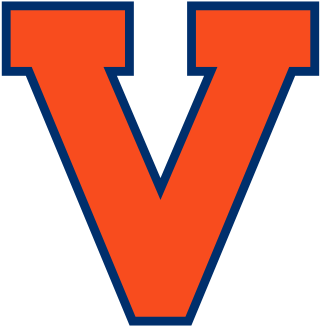
The Virginia–Virginia Tech football rivalry is an American college football rivalry between the Virginia Cavaliers football team of the University of Virginia and Virginia Tech Hokies football team of Virginia Polytechnic Institute and State University. The two schools first met in 1895 and have played annually since 1970. The game counts for 1 point in the Commonwealth Clash each year, and is part of the greater Virginia–Virginia Tech rivalry.

Scott Stadium, in full The Carl Smith Center, home of David A. Harrison III Field at Scott Stadium, is a stadium located in Charlottesville, Virginia. It is the home of the Virginia Cavaliers football team. It sits on the University of Virginia's Grounds, east of Hereford College and first-year dorms on Alderman Road but west of Brown College and the Lawn. Constructed in 1931, it is the oldest active FBS football stadium in Virginia.
Wahoo is a scombrid fish found worldwide in tropical and subtropical seas.

John Paul Jones Arena, or JPJ, is a multi-purpose arena owned by the University of Virginia in Charlottesville, Virginia. Since November 2006, it serves as the home to the Virginia Cavaliers men's and women's basketball teams, as well as for concerts and other events. With seating for 14,623 fans John Paul Jones Arena is the largest indoor arena in Virginia and the biggest Atlantic Coast Conference basketball arena located outside of large metropolitan areas. Sports Illustrated named John Paul Jones Arena the best new college basketball arena of the 2000s.

The Cavalier Marching Band (CMB) is the marching band at the University of Virginia. The band's original director, William "Bill" Pease, was the first full-time marching band director in the history of the University of Virginia. The Cavalier Marching Band made its debut on September 11, 2004, after a considerable donation was made by University of Virginia benefactors Carl and Hunter Smith to found the band in 2003. The CMB uses a mixture of both DCI-style glide step and Big Ten-style high step in its performances. Of its 200 members, all seven undergraduate schools at the University of Virginia are represented.

The IMP Society is a secret society at the University of Virginia in Charlottesville, Virginia, United States that is notable for combining philanthropy and public mischief.

The South's Oldest Rivalry is the name given to the North Carolina–Virginia football rivalry. It is an American college football rivalry game played annually by the Virginia Cavaliers football team of the University of Virginia and the North Carolina Tar Heels football team of the University of North Carolina at Chapel Hill. Both have been members of the Atlantic Coast Conference since 1953, but the Cavaliers and Tar Heels have squared off at least fifteen more times than any other two ACC football programs. Virginia and North Carolina also have extensive rivalries in several other sports.
Secret societies have been a part of University of Virginia student life since the first class of students in 1825. While the number of societies peaked during the 75 years between 1875 and 1950, there are several newer societies and seven societies that have been active for more than 100 years, including Seven Society, Z Society, IMP Society, Eli Banana, T.I.L.K.A. Society, and The 13 Society. The earliest societies, Eli Banana and T.I.L.K.A. Society, function as social clubs, while the Z Society, IMP Society, and Seven Society have a record of philanthropy and contribution to the university. Some of the more recent societies focus on the recognition or disapprobation of positive and negative contributions to the university.
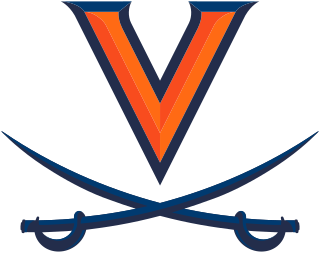
The Virginia Cavaliers, also known as Wahoos or Hoos, are the athletic teams representing the University of Virginia, located in Charlottesville. The Cavaliers compete at the NCAA Division I level, in the Atlantic Coast Conference since 1953. Known simply as Virginia or UVA in sports media, the athletics program has twice won the Capital One Cup for men's sports after leading the nation in overall athletic excellence in those years. The Cavaliers have regularly placed among the nation's Top 5 athletics programs.

The Virginia Glee Club is a men's chorus based at the University of Virginia. It performs both traditional and contemporary vocal works typically in TTBB arrangements. Founded in 1871, the Glee Club is the university's oldest musical organization and one of the oldest all-male collegiate vocal ensembles in the United States. It is currently conducted by Frank Albinder.

The Virginia Cavaliers football team represents the University of Virginia (UVA) in the sport of American football. Established in 1887, Virginia plays its home games at Scott Stadium, capacity 61,500, featured directly on its campus near the Academical Village. UVA played an outsized role in the shaping of the modern game's ethics and eligibility rules, as well as its safety rules after a Georgia fullback died fighting the tide of a lopsided Virginia victory in 1897.
"The Good Old Song" is the de facto school song of the University of Virginia. It is often said to be the university's fight song, although the actual fight song is "The Cavalier Song". It is set to the music of "Auld Lang Syne", a song frequently sung on New Year's Eve.
"The Cavalier Song" is the University of Virginia's fight song. The song was a result of a contest held in 1923 by College Topics, the university's student newspaper. "The Cavalier Song," with lyrics by Lawrence Haywood Lee Jr., and music by Virginia Glee Club member Fulton Lewis Jr., was chosen as best fight song while John A. Morrow's "Virginia, Hail, All Hail" was chosen as the best alma mater song.
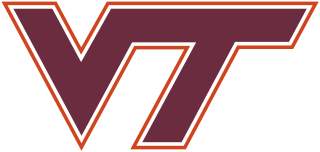
The Virginia–Virginia Tech rivalry is an American college rivalry that exists between the Virginia Cavaliers sports teams of the University of Virginia and the Virginia Tech Hokies sports teams of Virginia Polytechnic Institute and State University. The Cavaliers and Hokies had a program-wide rivalry first called the Commonwealth Challenge (2005–2007) which UVA swept 2–0 before ending the series in a show of sportsmanship following the Virginia Tech massacre. A second series called the Commonwealth Clash (2014–2019), under revised rules and sponsored by the state's Virginia 529 College Savings Plan, was again won by UVA, 3–2. A third series, also called the Clash (2021–present) and sponsored by Smithfield Foods, emerged two years after the previous series was concluded and is currently led by UVA, 2–1. The Cavaliers lead the rivalry series in the majority of sports.
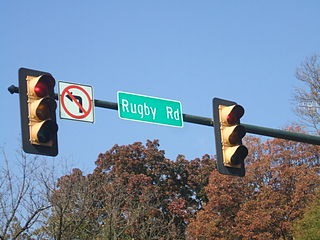
Rugby Road is a street in Charlottesville, Virginia that serves as the center of the University of Virginia's fraternity and sorority system and its attendant social activity. It is located across the street from central Grounds, beginning at University Avenue across the street from the Rotunda branching off at Preston Avenue and finally curving down to the 250 Bypass, and marks one end of The Corner, a strip of restaurants and stores that cater mainly to students. Rugby Road is lined with a variety of architecturally significant houses from several different decades. Many of these are currently used by fraternities and sororities, although the majority of them were originally intended for single-family use; William Faulkner was one famous resident while he was a writer in residence at the University.

"Hail to Pitt" is the most traditional fight song of the University of Pittsburgh, which is commonly referred to as Pitt. The saying "Hail to Pitt!" is also the most traditional and commonly used slogan of the University of Pittsburgh and its athletics teams. The slogan is frequently used in promotional material, printed on merchandise and souvenirs. It was also the title of a 1982 history of Pitt athletics by author Jim O'Brien. The slogan is often used among alumni as a statement of affiliation, including as a closing signature in conversation or correspondence between alumni, and is sometime abbreviated as "HTP" or "H2P", the latter of which is a registered trademark of the university and is frequently used on official university signage and merchandise.

The Virginia Belles is the University of Virginia's oldest all-female a cappella group based in Charlottesville, Virginia. The group was established in 1977 by Katherine Mitchell as the female counterpart to the Virginia Gentlemen, the university's oldest a cappella group. Completely student-run, the Belles continue to perform an eclectic range of vocal music from oldies and classic rock to indie and R&B. They sing in and around Charlottesville, and up and down the East Coast and all across the U.S., and have received awards and honors from internationally acclaimed organizations such as the Contemporary A Cappella Society, Varsity Vocals, and the Recorded A Cappella Review Board.
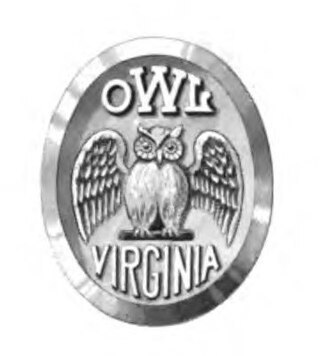
The O.W.L. Society, also known as the O.W.L. Club, was founded in 1887 at the University of Virginia as a secret society devoted to the literary arts. Founded in 1887, the O.W.L. Society is the oldest secret society existing at the university today, though it has not been in continuous existence since its founding.
William Alexander Lambeth was a medical professor who was the first athletic director at the University of Virginia. He is often called "the father of intercollegiate athletics" at the university.














